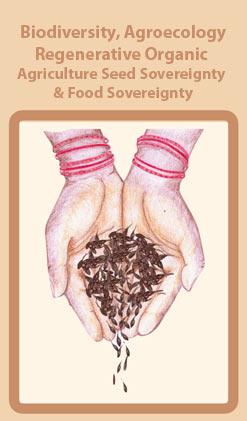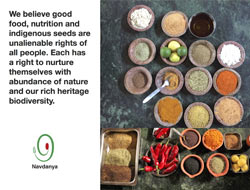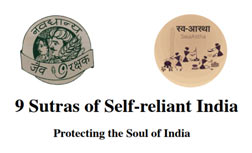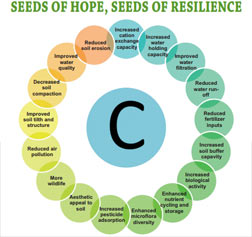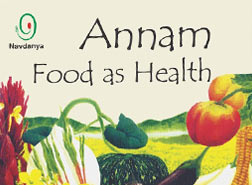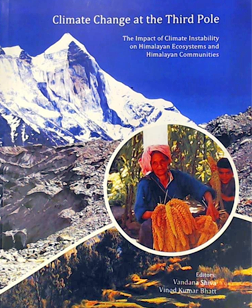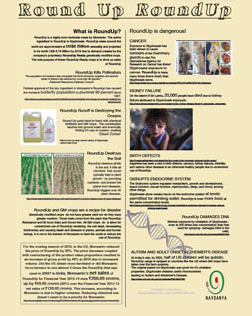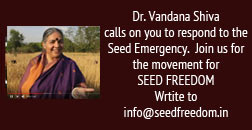Held on 4th and 5th April 2012
New Delhi
 To celebrate 25 years of Navdanya’s work in the conservation of Biodiversity, Navdanya with Initiative of Health and Equity in Society and All India Women’s Education Fund Association organized a two day Round Table on Intellectual Property Rights and Biopiracy.The emergence of monopoly over seeds and medicines through patents is becoming a major threat to farmers, livelihoods and public health. The round Table on Biopiracy exposed corporate globalization as a desperate process, which is attempting to privatize the resources, biodiversity and knowledge of the poor.
To celebrate 25 years of Navdanya’s work in the conservation of Biodiversity, Navdanya with Initiative of Health and Equity in Society and All India Women’s Education Fund Association organized a two day Round Table on Intellectual Property Rights and Biopiracy.The emergence of monopoly over seeds and medicines through patents is becoming a major threat to farmers, livelihoods and public health. The round Table on Biopiracy exposed corporate globalization as a desperate process, which is attempting to privatize the resources, biodiversity and knowledge of the poor.

Navdanya and RFSTE have been fighting against Biopiracy for for over a decade & half. In 1998, Navdanya started a campaign against Basmati biopiracy (Patent No. 5663484) of a US company Rice Tec. On Aug 14th 2001, Navdanya achieved victory against biopiracy and patent on life when the United States Patent and Trademark Office (USPTO) revoked a large section of the patent on Indian Basmati rice by the US corporations Rice Tec Inc. On January 27, 2004 Research Foundation for Science and Technology and Ecology (RFSTE) along with Greenpeace and Bharat Krishak Samaj (BKS) filed a petition at the EuropeanPatent Office (EPO), Munich, challenging the patent rights given to Monsanto on Indian Landrace of wheat, Nap Hal. The patent was revoked on October 2004, which once again established the fact that the patents on Biodiversity, indigenous knowledge and resources are based on biopiracy. Navdanya has also joined forces with European – NGO platform “No patents on Seeds” to file an opposition against Monsanto’s patent on the Indian Melon. (European Patent EP1962578).
 There are now more than 1000 patents in Europe on conventional breeding using traditional varieties. Dr. Vandana Shiva has called it an Emergency. Dr. Shiva pointed out how patents in vital areas like seed are a recipe for genocide. The 250,000 farmer’s suicides that have occurred in the past 15 years are closely linked to Seed Monopolies leading to a debt trap. Seed costs of cotton shot up by 8000% after Monsanto’s introduction of Bt-cotton. 95% of all cotton seed sold commercially is owned and controlled by Monsanto.
There are now more than 1000 patents in Europe on conventional breeding using traditional varieties. Dr. Vandana Shiva has called it an Emergency. Dr. Shiva pointed out how patents in vital areas like seed are a recipe for genocide. The 250,000 farmer’s suicides that have occurred in the past 15 years are closely linked to Seed Monopolies leading to a debt trap. Seed costs of cotton shot up by 8000% after Monsanto’s introduction of Bt-cotton. 95% of all cotton seed sold commercially is owned and controlled by Monsanto.
Mr. S P Shukla, who was India’s Ambassador to GATT, which led to the establishment of WTO and its TRIPS agreement gave the keynote address, and showed how TRIPS was introduced through the exercise of force – no logic, no negotiation. According to Mr. Shukla, “IPR’s are a function of how capital is reinforcing its position in a period of crisis. We are living in an age of monopolistic and oligopolistic control on knowledge and technologies where the commons are being commoditized, where even life is being commoditized, by claiming as invention, that which was not invented. ”

Dr. Biswajit Dhar, Director General of RIS, reiterated that the privatization of knowledge and biodiversity through Biopiracy is a desperate response of a system in decay. He said “The more they face an imminent break down, the more vicious they will become on enclosing the commons A lot of misinformation is being thrown at us in the name of ‘evidence’. We have to organize ourselves better to bring the truth in the public domain”.
 In the session on “Institutions and Instruments to Protect Biodiversity”, Dr. P.L. Gautam, Director, Protection of Plant Varieties and Farmer’s Rights Authority, Dr. V K Gupta, Director Traditional Knowledge Digital Library, and Dr. Satya Narayan from the ICMR presented the structures in place at the official level to prevent Biopiracy and defend traditional knowledge.
In the session on “Institutions and Instruments to Protect Biodiversity”, Dr. P.L. Gautam, Director, Protection of Plant Varieties and Farmer’s Rights Authority, Dr. V K Gupta, Director Traditional Knowledge Digital Library, and Dr. Satya Narayan from the ICMR presented the structures in place at the official level to prevent Biopiracy and defend traditional knowledge.
Leo Saldanha and Bhargavi of Environment Support Group, Bangalore who have been fighting against the Biopiracy of indigenous Brinjal variety by Monsanto / Mahyco for the Bt.Brinjal, presented the status of their case and reiterated their commitment to complete the process to stop the Biopiracy. They spoke about the callous disregard for biodiversity laws in India by Monsanto. “Along with its subsidiary Mahyco (in which Monsanto holds over 30% equity), and in collaboration with USAID and Cornell University fronted by Sathguru consultants, the US agribiotech giant accessed a dozen varieties of brinjal that are endemic to India during 2005, in a maiden attempt to develop B.t. Brinjal. Mahyco took its patented B.t. gene product and inserted these into the Brinjal varieties in labs and gave out packets of these seeds to local collaborating institutions through 2009, under the supervision of Genetic Engineering Approval Committee (GEAC) and the product was approved for commercial release by GEAC in October 2009 in the face of widespread public protests against releasing GMO foods in India. Yielding to public pressure, then environment minister Jairam Ramesh stayed the decision. However, the case assumes importance not merely for the crime committed by Monsanto/Mahyco and their collaborators, but also to enquire why several government regulatory bodies, and the NBA in particular chose to look away from this crucial aspect of compliance. 
Adv. Rajeswari Hariharan, who helped fight the case against the Biopiracy of turmeric, and also the case on the compulsory licensing of the cancer drug – Sorafenib - presented her experience on fighting illegitimate patents. Sorafenib costs Rs. 280,000/- per month of treatment.
Eminent Supreme Court Advocate Prashant Bhushan has worked with Navdanya on issues of Genetic engineering and plant patents spoke about the fight against the biopiracy of our traditional knowledge and biodiversity.

Kishore Tiwari of Vidharbha Jan Andolan, Dr. S Bala Ravi, Advisor, MSSRF, and Sri addressed issues of Seed Monopolies and the threat to Agriculture and Food Security. Kishan B Chaudhary, President Bharatiya Karshak Samaj. Mr. Tiwari showed how Bt.Cotton and Farmer’s suicides go hand in hand. “The cotton farmers are in deep crisis after 10 years of B.t. cotton. The spate of farmer suicides in 2011-12 has been particularly severe among B.t. cotton farmers. The extensive crop failures have exposed the false hype and advertising often, repeated by policy makers and regulators. In Andhra Pradesh, out of 47 lakhs acres of B.t. cotton planted, the crop failed in 33.73 lac acres as per state government estimates in December 2011. The cotton farmer crisis in Maharshtra has forced the government to declare Rs. 2000 crore as a compensation package. Maharashtra has seen the highest number of farmer suicides (3141 in 2010), particularly in the cotton-growing belt of Vidarbha and Marathwada.” Dr. S Bala Ravi presented the national and international laws on IPR related to seeds and how seed laws have been used to establish monopoly on seeds. “Quality seeds are important for better food security with increasing population. Monopolistic IPR increases seed prices which limits the access to seeds by small and medium farmers. 95% of the farm holdings in India are comprised of small, marginal and medium farmers and these farmers contribute to more than 50% of India’s food production”. Dr. Ranjit Roy Chaudhary, Dr. NarendraMehrotra (Jeevaniya), Dr. DineshAbrol (NISTADS), Dr. Mira Shiva (IHES), contributed to the session on Patents on Medicinal Plant and Patent Monopolies on Medicine. Dr. Chaudhary said that the mindset that IP creates innovation is not true. We have not put any new molecules on the map. “The entry of corporations into the patenting of plant based medicines has shifted the locus of control from local communities to multinational corporations”, added Dr. Dinesh Abrol.

Dr. SaralaGopalan, Ms. Shailaja Chandra, Dr. Darshan Shankar laid out the threats, challenges and strategies for the next 25 years. “Destruction of self reliance in rural and urban households in primary healthcare by destroying ecosystems and marginalizing endogenous knowledge systems is a major threat” added Dr. Darshan Shankar while presenting the threats and challenges for the next 25 years.
The Valedictory Address was given by Prof. Upendra Baxi.

The Intellectual Property Rights and Patent Regimes imposed by TRIPS are clearly dysfunctional from the perspective of justice and human rights. Corporations are seeking monopolies based on Biopiracy and Patents on Natural Processes.
The recent decision by the U.S. Supreme Court to strike down a patent of Prometheus on correlation between drug dosages and treatment, Dr. Vandana Shiva quoted Justice Stephen Bayer who said in the S.C. ruling:
“We conclude that the patent claims at issue here effectively claim the underlying laws of nature themselves. Just as Einstein could not have patented E=mc2 and Newton could not have laid claim to the law of gravity, so Prometheus cannot patent a test but that correlations a patient’s blood chemistry with the drug dosages for treatment”.

As the Round table clarified, Patents and IPR’s have crossed all boundaries. They need to be reined in, within the limits of ethics and justice, sustainability and democracy.


